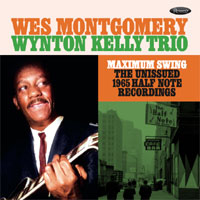Wes Montgomery & The Wynton Kelly Trio • Maximum Swing: The Unissued 1965 Half Note Recordings
Guitarist Wes Montgomery came from a musical family. His brother Buddy played piano and vibes, and his brother Monk was a bassist. In the late 1950s, the three performed as the Mastersounds, but the group dissolved in 1960, and it's not difficult to think that Wes's growing popularity was at least part of the cause. By the time he performed at the Half Note in 1965, Wes Montgomery was a headliner of the first rank, and arguably a hotter live ticket than almost all of his contemporaries. Maximum Swing also features pianist Wynton Kelly’s working trio: Kelly with bassist Paul Chambers and drummer Jimmy Cobb, all three of which played on Kind of Blue. On some selections, guests Ron Carter, Larry Ridley, or Herman Wright take Chambers' place, with an unidentified bassist sitting in on five tracks. The high-level music-making is replete with masterful touches. Wes Montgomery is known for the technique of plucking strings with the side of his thumb, which gives his playing a softened attack and a tonal richness that are distinct. Also distinct are Montgomery's solos, which often begin with single-note melodies, becoming octaves in middle choruses, and chords by the climax. You can hear this throughout, especially on the longer tracks. Montgomery can play with remarkable speed, even when his guitar sounds its fuzzy best. Kelly is often in supporting role, although he mirrors Montgomery's pacing and direction, the two reaching the same point together with uncanny ease. The recording quality varies from set to set, from okay -- a wide stereo spread, some hashiness in the midrange and treble, noticeable background noise, and an overall thinness -- to very good -- solid and focused -- with stops in between. Some of it was clearly impromptu while other of it is of commercial quality. Emcee Alan Grant interjects here and there, and I find each a charming reminder of a time and place gone by. Zev Feldman -- "the Jazz Detective" -- produced Maximum Swing, which is Resonance Records’ seventh Montgomery title, each having the full cooperation of the musician's estate. The 3000 180-gram vinyl copies were mastered by Bernie Grundman (following important restoration work by Matthew Lutthans) and pressed at Le Vinylist in Québec City, Canada. Most were a prize for standing in line during Record Store Day's Black Friday event, but Resonance Records still has some copies for sale on its website. The package includes a large-format booklet that features a biographical essay, unreleased photos, and remembrances of Wes Montgomery by Ron Carter and pianist Herbie Hancock, both of whom worked with the guitarist early in their careers; guitarists Bill Frisell and Mike Stern; and bassist Marcus Miller, who is Wynton Kelly’s second cousin. Maybe I'm in the minority, but I find these booklets interesting, providing bedtime reading that deepens my appreciation for the music. As Dennis Davis pointed out in his review, "[W]ith
many artists, recordings of live performances frequently trump the quality and intensity
of their studio albums." Why? Jazz is very much a right-now art, and a live
performance is a right-now event. These performances, occurring when Wes Montgomery and
Wynton Kelly were not only at the height of their powers but also commonly working
together, offer a view of their collaborative creativity and the era in which the
recordings were made. All history should be brought back to life so vividly. |

 t seems like fate that the review of this
three-LP set -- CDs and digital files are also available -- on The Audio Beat
follows a review that mentions a different recording featuring Wes Montgomery and the
Wynton Kelly Trio.
t seems like fate that the review of this
three-LP set -- CDs and digital files are also available -- on The Audio Beat
follows a review that mentions a different recording featuring Wes Montgomery and the
Wynton Kelly Trio.